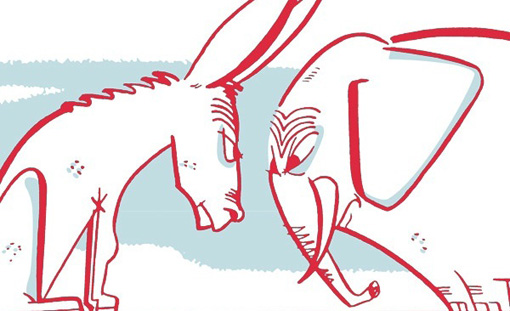
trap – noun ‘trap a position or situation from which it is difficult or impossible to escape.
Just Monday, Ohio Governor and failed candidate for the Republican Party nomination, John Kasich, ruled out the possibility of running for president as a third party candidate. He was asked to do so by forces associated with the Never Trump movement. “A third-party candidacy would be viewed as kind of a silly thing,” he said.
Several months prior, former NYC mayor Michael Bloomberg, after a more serious examination of a similar run, also ruled it out. After examining the data, he was convinced that he could “win a number of diverse states — but not enough to win the 270 Electoral College votes necessary to win the presidency,” he wrote in his own publication.
He further explained that his unsuccessful run would have led to its opposite goal: “there is a good chance that my candidacy could lead to the election of Donald Trump or Senator Ted Cruz. That is not a risk I can take in good conscience.” Why? Because, he continued, no candidate would win a majority of electoral votes, and when that happens, the House of Representatives decides (with each state having one vote). The Republican majority would “certainly” vote for the Republican nominee, Bloomberg concluded.
Congress has determined the winner in Bloomberg’s scenario in only two elections: 1800 (Thomas Jefferson) and 1824 (John Quincy Adams). (It also decided the outcome in 1876, but that is a much more complicated story.)
More typically, third-party candidacies do not throw the election to the House but instead help the candidate at the opposite end of the political spectrum. Nearly every country that uses our system, formally called the single-member district plurality system, has just two major political parties. Third parties running in presidential elections rarely win more than a percent or two. In any given state, if the number of these votes is insignificant, nothing changes; but if it is significant, the opposite party benefits. And “significance” can be a small figure, because we really don’t have one national presidential election but rather 50 state elections-whoever wins the most votes in a given state wins all of that state’s electoral votes.
Ralph Nader, running in 2000, took so many votes away from Al Gore in Florida that the state’s results were razor thin. So thin that, when combined with the problem of ambiguously recorded ballots, a recount was ordered, though it was stopped by the U.S. Supreme Court, thus allowing George W. Bush to win that state and hence the national election. Nader didn’t mind; he wanted to punish the Democrats and his campaign intentionally went to Florida in the last days of that election to increase their own vote total.
Today, the Republican Party and the Never Trump movement face this dilemma. Take a “reasonable” Republican and run him or her as a third party, and sure enough, the Democratic Party nominee probably wins much more easily than in a typical two-candidate election. Not an issue in solidly Republican states (like Texas) or solidly Democratic states (like California), but a major issue in the so-called battleground states.
G. William Domhoff, professor of psychology and sociology at the University of California, Santa Cruz, provides us with the classic case when a two-party system became a multi-party system. It was Belgium, in the 1890s. The country’s Socialist Party was becoming a major force while its Liberal Party was in serious decline. The Catholic Party, the strongest party, changed the electoral laws instead of facing the Socialist Party head to head, for that country, like ours, required only a plurality of votes (the most, not the majority) to win elections. Meaning, if the Liberal Party won a few votes, but the Socialists won more than the Catholic Party, the new leftwing party would have swept the parliament elections.
As long as we have our two-party system, the winner of our elections will be either the Democratic or the Republican party. It is a reality that some, usually on the Left, would like to disappear, but wishful thinking has never led to political victory. If the case of Belgium of yesteryear holds true, the system will not be changed by either one or both of the two major parties until either or both fear a takeover by an insurgent party.
In this regard, supporters of Senator Bernie Sanders (Vermont) should take heed: either the Republicans or the Democrats will win the presidency. Whoever wins will appoint one or two, maybe even three Supreme Court justices. Not just that: on the coattails of every presidential victory is often a change in the U.S. Senate or the House. Some of the more sober Republicans (a decreasing breed) fear this the most-a Trump candidacy might result in the GOP losing the presidency, the Supreme Court, probably the U.S. Senate, and by a long-shot, the House. Everyone who opposes the Republicans and all that they stand for can either be part of their defeat, or they can sit on the sidelines, complain that the choices aren’t good enough, and the far right will be escape maximum damage.
I exercised my democratic right to participate in the Sanders campaign. I was with the petitioners in the South Bronx in January, distributing literature while they gathered signatures to put him on the ballot. I shortchanged my sleep, waking up an hour or two early, in order to distribute his literature in my congressional district after he was on the ballot. I canvassed housing projects, targeting likely Sanders voters, to mobilize them for the primaries. And I think the strong Sanders showing helped move Secretary Hillary Clinton to more populist positions, undermined the lunacy of the Republican candidacies, and provided a fresh critique of our complicated electoral process.
However, it will soon be time to face the reality of the two-party general election. I am willing to enter the reality of our system and help elect Secretary Clinton, the likely nominee. Our country has a raving lunatic as her opponent; sitting this one out, or wasting it on a third-party ticket, especially in “purple” states, will have the opposite effect.
Photo: TheAnchorOnline.org












Comments